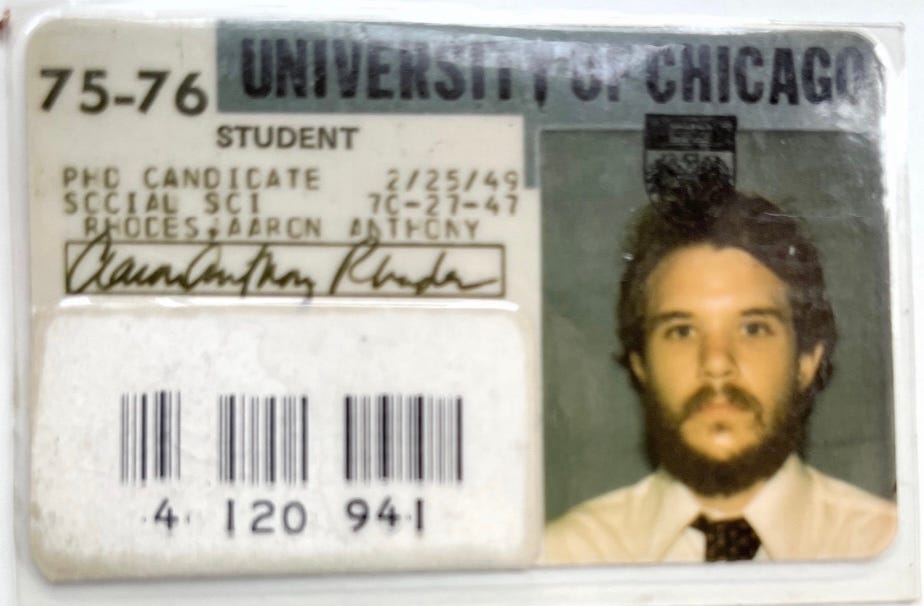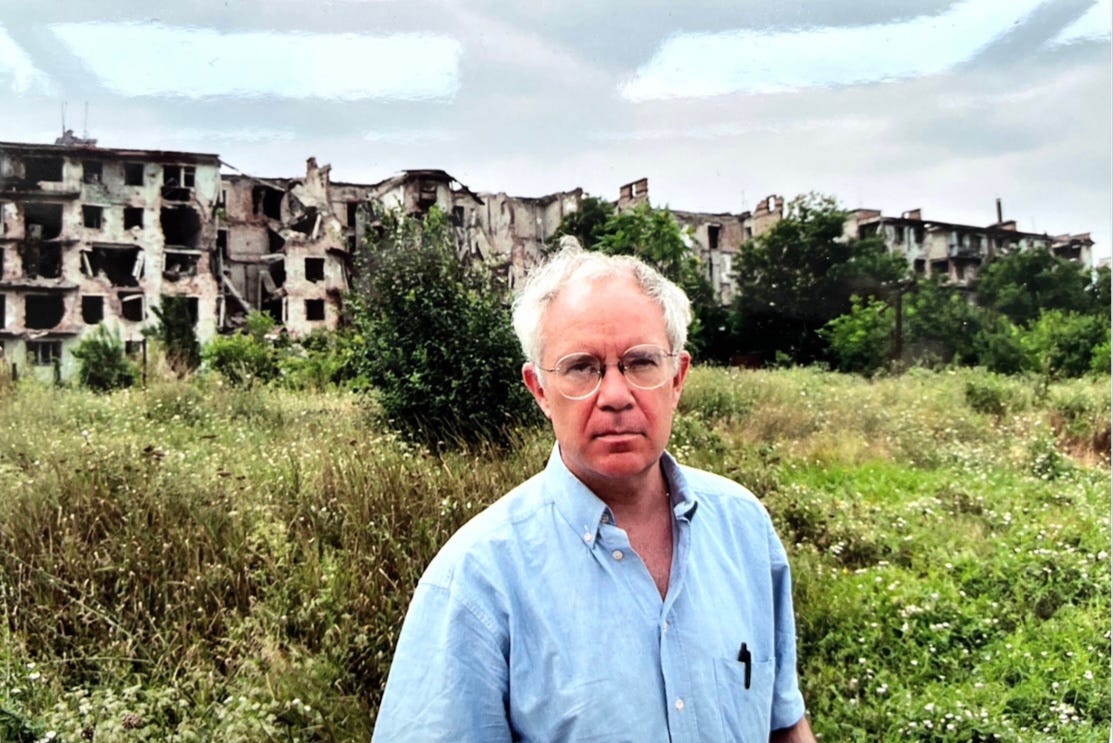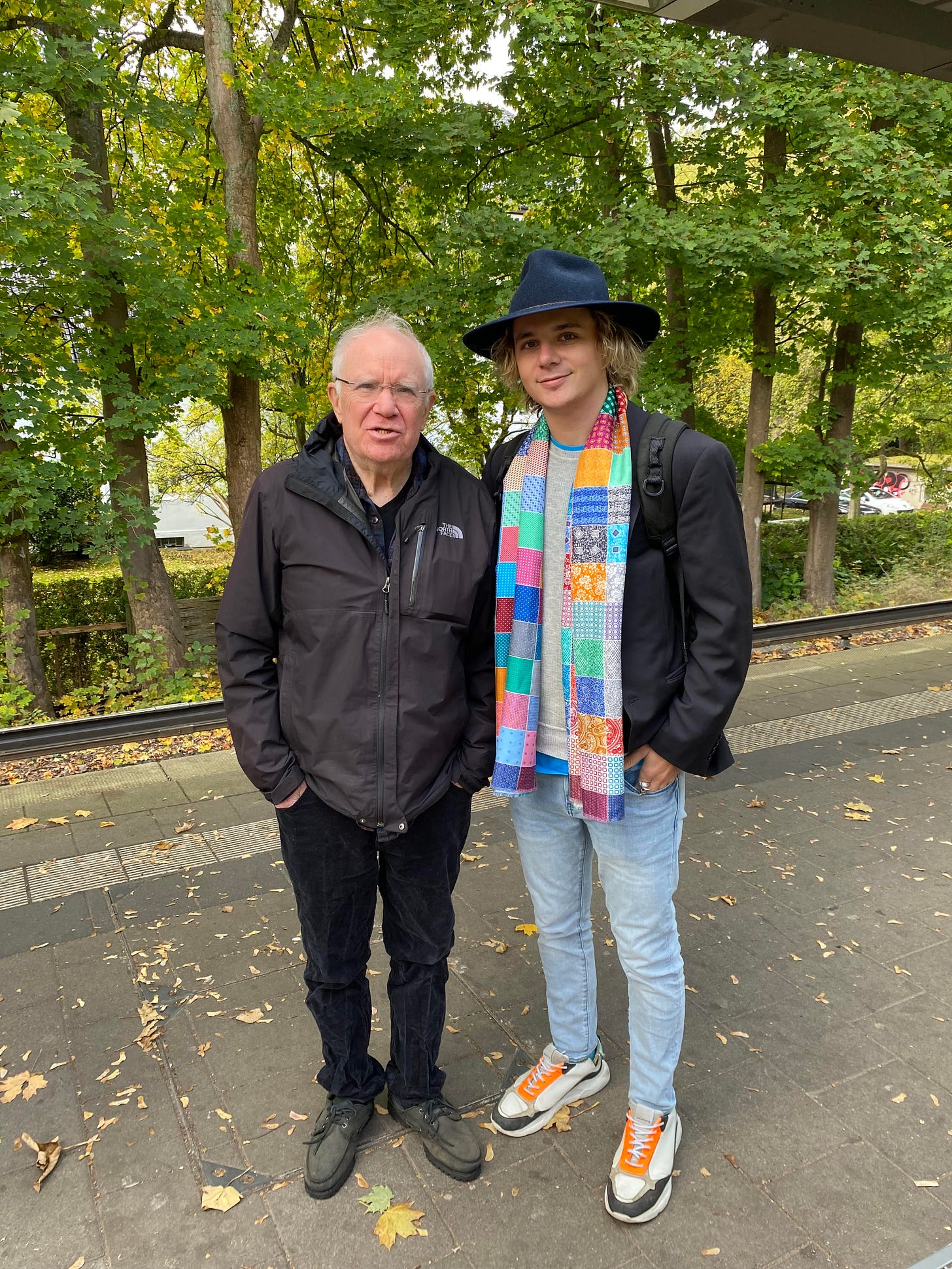My Friend, Aaron: The Man who Stood Alone
a trip to hamburg, an unlikely friendship, and a tale of reinvention
I first met Aaron at the closing dinner of the Common Sense Society’s Brittania Fellowship in autumn of 2022. The atmosphere in that rural English dining hall was somber as the Queen has died earlier that day and dinner began with a toast to her and well wishes for Charlie.
As it happened, Aaron and I sat next to each other and began chatting about how to eat the goopy soup-like Camembert dish that had been placed in front of us. Despite my appreciation for cheese, I’d never seen anything quite like it and—out of curiosity and embarrassment that I didn’t know how to consume what had been placed in front of me—I glanced around to see if I might reap answers from the consumption habits of my peers. In my glancing, I caught Aaron doing the same. And so began a conversation about cheese and how to eat it. It was a small, trivial detail in an action-packed week and a historically significant day. But it’s things like these that one remembers, for it was over our shared confusion that we first became friends.
At the conclusion of the conference, we went our separate ways and didn’t talk much for about a month, when I found myself in Berlin visiting a friend. As Aaron lives in Hamburg, I reached out and asked if he’d be keen to meet. He was, which brings us to the subject of this story.
For two days, I joined his world—eating meals with his family, helping out with house chores, working out of his office, and playing basketball with his 11-year-old daughter. He’s got two, actually, and he lives for them. Watching this 73-year-old man raise his second set of kids brought me great joy. Some people don’t get to do the parenting thing at all. Aaron relishes in his ability to do it twice.
My visit taught me things about Aaron that I never would’ve gotten from a coffee-shop interview—like that he is a defenestrator of gender roles. Where men of his generation typically hold somewhat rigid ideas about gender roles,
Aaron happily does much of the cooking and cleaning in his abode. I wouldn’t exactly call him Gordon Ramsay, but he knows his way around an oven, a pot of boiling water, and a frying pan. The seared chicken breast and spaghetti with pesto I shared with him and his daughters on the final night of my stay was delicious. We even turned that particular affair into a makeshift Shabbat.
To be clear, Aaron is something of a celebrity in his own right, but seeing as he’s not Kim-level famous, I would be remiss not to give you the cliff notes. Among a hundred other things, he’s a human rights activist who has dedicated the last thirty years of his life to defending basic freedoms, and to a thankless, uphill battle with the international human rights establishment.
Appointed as Executive Director of the International Helsinki Federation for Human Rights, he served faithfully for 14 years, pushing for a post-soviet liberalization of dozens of countries in eastern Europe and western Asia. After abdicating the position in 2007, he went on in 2008 to co-found the International Campaign for Human Rights in Iran as well as the Freedom Rights Project in 2012. In 2014, he was appointed President of the Forum for Religious Freedom Europe. Outside of his official appointments, he’s written and published widely in the Wall Street Journal, The Hill, and Providence Magazine among others. In 2018, he published The Debasement of Human Rights: How Politics Sabotage the Ideal of Freedom.
Though self-interested big wigs in the mainstream human rights establishments try (unsuccessfully) to ignore Dr. Rhodes, his incisive criticism has found traction in liberty-focused organizations like the Cato Institute, the Victims of Communism Memorial Foundation, the Heritage Foundation, and the Common Sense Society—where Rhodes is a Senior Fellow.
Testament to his work, he was made an honorary citizen of Austria in 2008 and in 2009, the University of Chicago awarded him a Public Service Citation. Former Secretary of State Mike Pompeo reportedly cited The Debasement of Human Rights as a key factor in his decision to establish a Commission on Unalienable Rights.
Aaron’s essential thesis has two facets. The first is that human rights discourse has been highjacked by those who seek to legitimize policy proposals which have very little to do with actual human rights. The second is that the international human rights system is flawed in its inclusion of dictatorships and other bad actors who wrongfully benefit from legitimacy on the basis of their inclusion.
The first is a nomenclature issue. Using the respect and repute of human rights language and lingo to advance their preferred policies even when such policies have absolutely nothing to do with human rights, selfishly interested political operators dilute and pollute human rights discourse. Examples of this include sexual identity politics in the United States and welfare issues, among others.
In Aaron’s view, these are issues that should be addressed by civil society and positive law but not by courts as matters of human rights. Allowing democratic institutions to abdicate their role and cede it to the latter is counterproductive, silly, and dangerous. Noting that he’s a Classical Liberal, Rhodes told me that contrary to what goes on in China, Russia, or Iran, “the amelioration of social and moral problems in liberal societies does not lie in a capitulation to those challenges in the form of authoritarian illiberalism.”
Unsparing in his words, Aaron continued, bluntly stating that “liberalism, and its intrinsic counterpart individualism, are not to be blamed for negative social and cultural trends that call them into question. Rather, the failure of civil society to live up to the moral challenges of freedom is responsible. It is the fault of the very professors, preachers and pundits who today advocate for broader state authority to clean up the mess they–we—have created. Actors in the zone of civil society have defiled the promise of liberalism.”
“A world where people in many places seek the blessings of freedom will always be one ridden with conflicts,” he explained. “Why is it that, especially in America today, differences of opinion are not tolerated, and many see political conflict as war, and seek to vanquish and silence ‘enemies?’ Liberal democratic societies are based, not on an ideal of harmony and unity, but on a recognition of pluralism, and the embrace of common rules and standards for defining goals and policies. For decades, Americans have been advising people in transitional societies that democracy is messy, but it is a lesson that many here at home seem to have forgotten.” That’s point number one.
On the subject of point number two, Aaron laments that the international human rights establishment gives human rights violators a seat at the table, including them in multilateral treaties, resolutions, councils, and associations, which they use to claim legitimacy. Need proof? Currently, the United Nations International Human Rights Council counts China, Cuba, Pakistan, Russia, Uzbekistan and Venezuela as members. Each of these regimes has repeatedly brutalized their own people. And yet, their membership on the Council lends them undeserved legitimacy. Their inclusion, Aaron believes, is shameful.
This may seem obvious, but Rhodes counts few contemporaries who are equally willing to stand up and say: “you can’t be serious!” This is because he’s not a career NGO jockey or power junky. To say that he’s not the kind of guy you’d expect to be a human rights advocate would be an understatement. He doesn’t believe in pussyfooting or towing the party line. He’s irreverent, slightly cantankerous, and unassuming. But he’s a maverick, a hard-nosed, practical guy who’s been marching to his own drummer as long as he’s been around.
He grew up working on dairy farms near the small town of Hornell, in a region of upstate New York around the Finger Lakes. His parents were both artists who came of age in the Depression era. He’s written about the complicated yet beautiful relationship he had with his mother. His father was a mural painter and ceramic artist whose work is featured on a US postal stamp.
Rhodes’ 1971 Yearbook Picture at Reed College
In 1967, Rhodes graduated from Alfred-Almond Central School and went to Colby College. He lasted a year there, but, wanting a more serious collegiate experience, transferred to Reed College. Relocating alone to the other side of the country, Aaron undertook the first of many maverick moves. There he fell under the supervision, spell, and auspices of Anthropology Professor Gail Kelly, who took him under her wing and got him to think about his studies seriously. So much of life is grabbing somebody by the shoulders and saying: “you can do it!” That’s what Gail did for him. He still talks about her more than 50 years later.
While at Reed, Aaron steered clear of the hippies and malcontents and found community in a soul band called The Rhythm Method—a comical reference a birth control method popular in those days. And he continued playing after college. From 1971-1972, Aaron Rhodes was a rockstar. Well, in fairness, that’s a generous characterization. He mostly shlepped his trumpet around highway-side pubs and other less-than-luxurious establishments in Western New York. But a nagging desire to continue with his studies led him back to academia. Hanging up his rock and roll shingle, Rhodes got himself admitted to a PhD program at the University of Chicago’s Committee on Social Thought. It was Kelly, who had called to put in a good word.
Rhodes’ 1975 UChicago Student ID
Unconventional in his ways, Rhodes went on to complete the PhD program on his own terms. During the day, he did serious scholarly work with luminaries like Saul Bellow and Edward Shils, but at night and between classes, he steeped himself in the machinations and fuckery of municipal Chicago politics—specifically those of
longtime mayor Richard J. Daley. It was the heyday of City Hall—William Boss Tweed incarnate, 100 years later in a city 800 miles West.
His business in politics came to an unceremonious halt when, bucking a local ward boss, Rhodes decided to run for state representative and lost. But, as in everything, there was a silver lining, and in this case that lining came in the form of Kantian philosopher, Massachusetts gubernatorial candidate, and president of Boston University: John Silber. Rhodes noted in our discussions that, from Silber, he learned much on the subject of effectively overseeing large bureaucracies and to managing complex institutions.
In 1991, Rhodes moved to Vienna to take up a post at the Institute for Human Sciences, focusing chiefly on the project of reforming universities in post-soviet countries. As Kelly had hooked him up with Shils, Shils in turn had hooked him up with Polish philosopher and activist Krzysztof Michalski, with whom he worked closely at the Institute.
In 1993, he was tapped to direct the International Helsinki Federation, which he went on to run for fourteen years as it expanded in power, size and influence. "I think I helped the organization (which had achieved fame during the Cold War for work behind the Iron Curtain) find its voice in the post-1989 Situation” he told me. “I also helped it become more professional, larger, expanding its work into new areas [including] Central Asia.”
Rhodes on a Mission in Chechnya, 2002
It was then—at 45 years old—that Aaron’s career as a human rights activist began in earnest. It wasn’t destined or meant to be by any stretch of the imagination. But it’s often outsiders that are best able to rock a boat, shock the world, and effectively enact change.
Whether it’s founders on a mission, members of the self-help Twitterati, or Michael Keaton’s Ray Kroc, a quote often attributed to Calvin Coolidge gets tossed around a lot nowadays. “Nothing in the world can take the place of persistence,” Coolidge (may or may not have) said. “Talent will not; nothing is more common than unsuccessful men with talent. Genius will not; unrewarded genius is almost a proverb. Education will not; the world is full of educated derelicts. Persistence and determination alone are omnipotent.”
For Aaron, all of this rings true. Life has not been kind to him and in 73 years, he’s been dealt more than his fair share of shitty hands from a cruel and indifferent universe. Yet he doesn’t complain. He keeps his chin up, and he keeps going.
In 1983, after 10 years of putting in the hard yards, Rhodes was muscled out of the Daley machine. Instead of sulking, he moved forwards and began working with the Silbernator in Massachusetts. In 2001, about half a year before 9/11, his beloved wife Sara Silverman Rhodes—who had long suffered from manic depression—committed suicide, leaving Aaron to raise a twelve year old and sixteen year old by himself. In 2007, Rhodes discovered that one of his employees at the IHF had been embezzling money and decided to resign. In his view, it was the right thing to do. There are some who might have dwelled in a sorry state for some time, lamenting that the organization they had helped build for more than a decade had collapsed, leaving them high and dry. Not Aaron. It wasn’t his first rodeo in the form of a harsh setback.
A year later, he was made an honorary citizen of Austria. He also co-founded the International Campaign for Human Rights in Iran. In 2009, he received that Public Service Citation from the University of Chicago before going on to found the Freedom Rights Project in 2012, to get tapped for presidency of the Forum for Religious Freedom Europe in 2014, to publish The Debasement of Human Rights in 2018, and to begin work with the Common Sense Society in 2021.
While the death of a loved one leaves unhealable scars on one’s heart, he even managed to get remarried and is currently raising two beautiful daughters—both of whom I met and spent time with—in Hamburg. His youngest has Cerebral Palsy following a very premature birth and doesn’t experience or communicate with the world in the same way that most people do. Raising children is, in all cases, a tall task. But it’s one away from which Aaron didn’t shy, the first or the second time.
Aaron Rhodes reminds me in many ways of somebody who has taken to heart the advice of Kipling’s If or Stallone’s Rocky. And he shows no signs of slowing down.
As I sat there on my final evening with Aaron, turning a dozen hours of interviews over in my head, I smiled at the thought that our unlikely friendship began with, of all things, camembert. And yet, there we were, two Americans in Hamburg—drinking vodka, eating chocolate, and trading jokes late into the night.
Aaron and I, October 2022
27 Rouge💄 is a reader-supported publication. My independence as a writer, podcaster, and idea sharer affords me the freedom to write, speak, and produce unencumbered. If you find my work to be engaging and useful, please share 27 Rouge and consider becoming a paid subscriber or making a one-off or recurring donation. You won’t regret it. Or maybe you will :D
Originally published in Soigné





